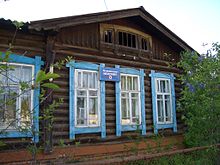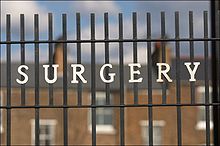- Clinic
-
For other uses, see Clinic (disambiguation).
 A medpunkt (health care access point) delivers primary health care to the residents of the village of Veliki Vrag in Nizhny Novgorod Oblast, Russia
A medpunkt (health care access point) delivers primary health care to the residents of the village of Veliki Vrag in Nizhny Novgorod Oblast, Russia
A clinic (or outpatient clinic or ambulatory care clinic) is a health care facility that is primarily devoted to the care of outpatients. Clinics can be privately operated or publicly managed and funded, and typically cover the primary health care needs of populations in local communities, in contrast to larger hospitals which offer specialized treatments and admit inpatients for overnight stays. Some clinics grow to be institutions as large as major hospitals, or become associated with a hospital or medical school, while retaining the name “clinic”.
Clinics are often associated with general medical practice, run by one or several general practitioners or practice managers. Physiotherapy clinics are usually operated by physiotherapists and psychology clinics by clinical psychologists, and so on for each health profession. Some clinics are operated in-house by employers, government organizations or hospitals and some clinical services are outsourced to private corporations, specialising in provision of health services. In China, for example, owners of those clinics do not have formal medical education. Health care in India, China, Russia and Africa is provided to vast rural areas by mobile health clinics or roadside dispensaries, some of which integrate traditional health practices. In India these traditional clinics provide ayurvedic medicine and unani herbal medical practice. In each of these countries traditional medicine tends to be a hereditary practice.
Contents
Etymology
The word derives from the Greek klinein meaning to slope, lean or recline. Hence kline is a couch or bed, klinikos is sloping or reclining and Latin is clinicus.[1] An early use of the word clinic was, 'one who receives baptism on a sick bed'.[2]
Function
The function of clinics will differ from country to country. For instance, a local general practice run by a single general practitioner will provide primary health care, and will usually be run as a for-profit business by the owner whereas a government specialist clinic may provide subsidized specialized health care.
Some clinics function as a place for people with injuries or illnesses to come and be seen by triage nurse or other health worker. In these clinics, the injury or illness may not be serious enough to warrant a visit to an emergency room, but the person can be moved to one if required. Treatment at these clinics is often less expensive than it would be at a casualty department. Also, unlike an ER these clinics are often not open on a 24 x 7 x 365 basis. They sometimes have access to diagnostic equipment such as X-ray machines, especially if the clinic is part of a larger facility. Doctors at such clinics can often refer patients to specialists if the need arises.
Types
There are many different types of clinics providing outpatient services. Such clinics may be public (government funded) or private medical practices.
- In the United States, a free clinic provides free or low-cost health care for those without insurance.
- A Retail Based Clinic is housed in supermarkets and similar retail outlets providing walk-in health care, which may be staffed by nurse practitioners.
- A general out-patient clinic is a clinic offering a community general diagnoses or treatments without an overnight stay.
- A polyclinic is a place where a wide range of health care services (including diagnostics) can be obtained without need of an overnight stay
- A specialist clinic is a clinic providing advanced diagnostic or treatment services for specific diseases or parts of the body. This type of clinic contrasts with general out-patient clinics, which deal with general health conditions and disease categories.
- A sexual health clinic deals with sexual health related problems, such as prevention and treatment of sexually transmitted infections.
- A fertility clinic aims to help women and couples to become pregnant.
- An abortion clinic is a medical facility providing abortion and related medical services to women.
- An ambulatory surgery clinic offers outpatient or same day surgery services, usually for surgical procedures less complicated than those requiring hospitalization.
Examples
- Tavistock Clinic, part of the British NHS, was founded in 1920's. One of its most celebrated members was R D Laing.
- San Francisco's Suitcase Clinic is a prime example of a free clinic.
- Christian Medical College & Hospital in Vellore, India has extensive roadside dispensaries and began as a one bed clinic in 1900.
- The Edmonton Clinic is a joint venture of the University of Alberta and a government health care body Capital health, expected to be completed in 2011.
- The Shyness Clinic founded by Zimbardo to assist those disabled by public or private shyness.
- La Borde clinic in the Loire valley France, is an innovative psychiatric clinic where patients are liberated to actively participate in the running the facility.
- The Mayo Clinic, Cleveland Clinic, and Lahey Clinic are three examples of comprehensive health care systems. Both began as much smaller group practices that have grown into large medical programs in the United States, whilst retaining their names.
- The Gary Burnstein Community Health Clinic, a non profit, volunteer supported Free Clinic in Pontiac, Michigan.
See also
- Health care provider
- Health center
- Health systems management
- Healthcare system
- Nurse-led clinic
References
- ^ 'Origins - a short etymological dictionary of modern English' by Eric Partridge Book club associates 1966
- ^ Webster's Revised Unabridged Dictionary (1913 )
Health care Economics · Equipment · Guidelines · Industry · Philosophy · Policy · Providers · Ranking · Reform · SystemProfessions Settings Care Skills / Training Categories:- Types of healthcare facilities
Wikimedia Foundation. 2010.

